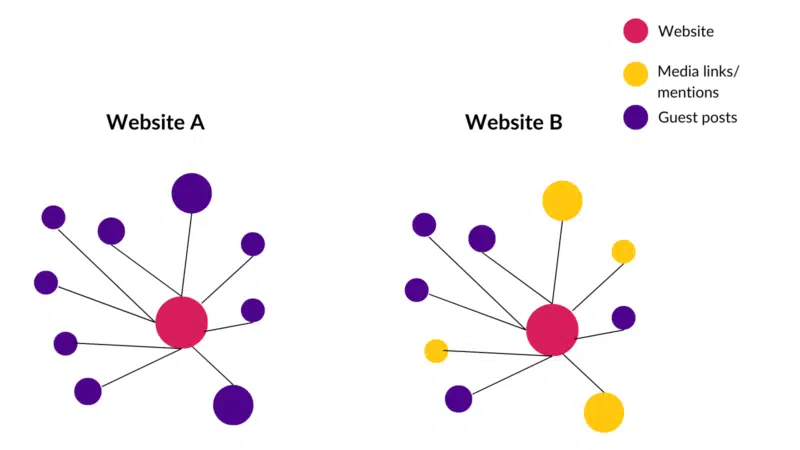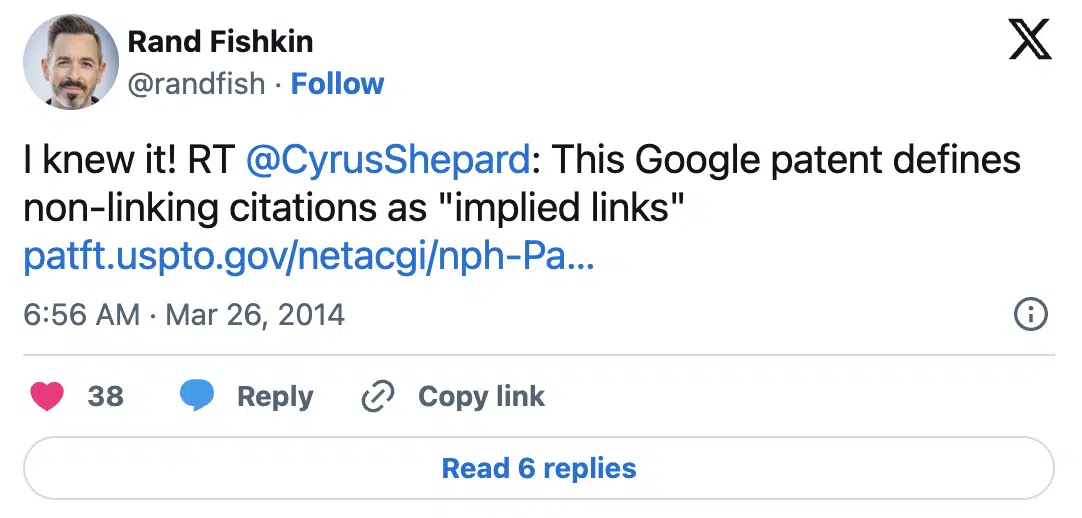Why brand mentions are the future of backlinks
Learn why Google's emphasis on entities makes brand visibility crucial for organic growth and how digital PR shapes the future of SEO.
“Stop building links; build your brand.”
These six words should be plastered on the desks of every SEO in the world.
In this article, I’ll explain why brand mentions are the new backlinks. Let’s dive in.

Back to the brand future
Nearly 10 years ago, Rand Fishkin was talking about brand mentions.

That wasn’t a typo; it’s been nearly 10 years!
Why? Well, Google themselves filed a patent on the very concept.
Also, a decade ago, the PR world went wild talking about the patent.
For those who don’t know, it was this section they drooled over.
“The system determines a count of independent links for the group (step 302). A link for a group of resources is an incoming link to a resource in the group, i.e., a link having a resource in the group as its target. Links for the group can include express links, implied links, or both. An express link, e.g., a hyperlink, is a link that is included in a source resource that a user can follow to navigate to a target resource. An implied link is a reference to a target resource, e.g., a citation to the target resource, which is included in a source resource but is not an express link to the target resource. Thus, a resource in the group can be the target of an implied link without a user being able to navigate to the resource by following the implied link.”
Known as the “Panda patent,” it introduced the concept of express links and implied links.
- Express link: A hyperlink (follow or nofollow).
- Implied link: A reference to the target resource, but not a link.
Moz wrote an excellent article explaining all this in 2014.
The logic is quite simple. Google knows people buy and sell links, so moving away from this would always be a good idea.
But the link economy is large, and SEOs are stubborn. Due to the nature of SEO and the obsession with links, SEOs have been blindly ignoring marketing as a tool for SEO and relying on links.
And sure, that has worked, without a doubt.
But we’re not in 2014 any longer.
LLMs and SEO in an AI era
We all know it’s coming. Like a dark cloud on the horizon, Google will eventually launch its new AI-powered search engine.
It’s like a looming date in the future where every SEO feels like the Jedi when the Emperor unleashed Order 66.
AI is complicated; we all know this. But we also know that large language models (LLMs) are being trained on text data from the most popular websites in the world.
We also know that Google crawls the web and has its Knowledge Graph.
Text is suddenly becoming more important because it’s what trains these LLMs.
This brings us back to the importance of entities in the modern SEO landscape.
Remember, brands are entities.
Tell people (and Google) you exist
If I were to give one piece of powerful marketing advice, it would be this.
Focus on telling more people you exist.
Sounds simple.
And yet, people in marketing have entirely gone away from this principle and adopted an “all we need to do is be listed on search engines.”
Which was dumbed down to “all we need to do is to pay search engines to be listed.”
And this is where we’ve hung our hats for the last 10 years.
Except it doesn’t work like that.
People go to the web and end up in the messy middle of Google search.
They click, read, get distracted by the message they just got on WhatsApp, and then leave, call their friend, and watch Netflix.
It might be days, weeks or months before they think, “Oh, I need to sort that,” and head back to a search engine. They click some ads and organic listings, and they leave again.
Rinse and repeat, until they eventually decide who they’ll purchase from and click their ad.
And this is why last-click attribution has reigned supreme and seen paid search as a revenue driver.
But this tells few people you exist.
Paid search, by its very nature, seeks to reduce waste, and as such, its reach is limited.
Organic search is far more powerful and reaches more people without incremental media spend.
And beyond this publicity.
Tell huge numbers of people you exist while at the same time building links and brand mentions, positioning you as the guide they need in their lives.
Beyond this is TV ads, but as we know, this is beyond most budgets.
This is a core superpower of publicity. Reach.
You create the news, tell people you exist, and reach people who have never heard of you.
And yes, this content is crawled and indexed by Google. It knows what you are, what you do and the knowledge you’re supplying others.
That’s about as clear and straightforward as it can be in terms of E-E-A-T.
The judges want an easy night
I used to be a boxer. And my old coach told me that the judges wanted to have an easy night and go home.
The sport is set up for this with clear colors with red and blue corners. And his coaching advice was to land clear, crisp punches.
It worked, and I won a lot of fights.
Google is absolutely the same.
It wants to know what you are and what you do and for it to be able to extract information from your site as easily as possible.
And this is another reason that brand mentions are so powerful.
You are giving Google clear signals about what you are, what you’re an expert in and where to find you.
“According to the (subject) experts at (brand name)” is an example of how the media might quote you.
But will the link matter?
Dig deeper: Digital PR vs. manual link building: Adapting to the modern search landscape
Publicity first, links second
Jane Hunt, one of Britain’s best digital PR experts (and my boss), has a saying:
- “Digital PR is the intersection of traditional PR, content marketing and SEO. We’re borrowing from traditional PR and content marketing techniques and fusing them with SEO strategy to build organic search visibility and drive brand credibility and trust.”
And this is why brand mentions are so powerful.
Because the brand comes first, before the link. But the link and the mention fuel organic search.
Yes, everyone likes a link, and they also make life easier for search users.
But it’s the brand publicity that drives the link. Brands help people make decisions because we’re creatures of heuristics. There is way too much to think about in today’s society, and brands make decisions easier.
Traditional PR and content marketing tactics work by helping brands improve their relationship with the public and become trusted.
What digital PR does is leverage these tactics for the digital age to support organic search growth.
And this trend will definitely continue.
We can already see that Google favors brands, as well as media and large publishing sites.
And brands get featured in the media.
It’s digital PR that fuels those features.
And in the future of search, you want more of them, not less.
Brand mentions are the fuel to aim for.
Not only will you get a percentage of links, but you’ll also get a far higher percentage of brand mentions.
Contributing authors are invited to create content for Search Engine Land and are chosen for their expertise and contribution to the search community. Our contributors work under the oversight of the editorial staff and contributions are checked for quality and relevance to our readers. The opinions they express are their own.
Related stories
New on Search Engine Land